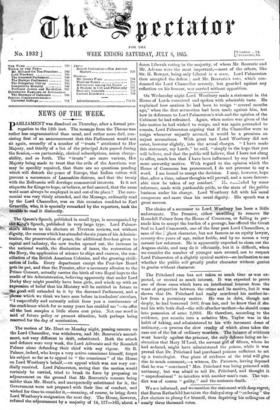The Pritchard case has not taken, BO much time as
WA ex- pected, or created so much interest. It was expected to prove one of those cases which have an intellectual :interest from the want of proportion between the crime and its motive, but it was. shown that Dr. Pritchard had really murdered his .mother-in- law from a pecuniary motive. He was in debt, though not deeply, he had borrowed 500/. &lax her, and he *new that if She and his wife both died—the wife afterher mother—he should come into possession of some 2,000/. He therefore, according to the evidence, put aconite into a sedative Mvs. Taylor was in the habit of taking, and administered to his wife incessant doses of antimony,—a process the slow cruelty of which .alone takes the case out of the list of ordinary murders. The balance of evidence went heavily agafitst the prisoner, the only defence being an in- sinuation that Mary M'Leod, the servant '1014 of fifteen, whom he had seduced, might have administered the poison, while it wax proved that Dr. Pritchard had purchased poisons sufficient to set up a toxicologist. One piece of evidence at the trial will give rise to much comment,—a witness, Dr. Paterson, having deposed that he was "convinced" Mrs. Pritchard was being poisoned with antimony, but was afraid to tell Dr. Pritchard, and thought it " unprofessional " to interfere with another man's case. The ver- dict was of course "guilty," and the sentence death. -'






























